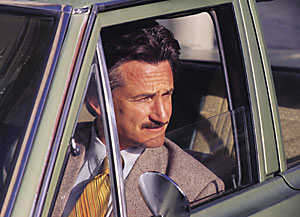 |
|
PHOTO COURTESY THINKFILM
|
"Nixon" - Sean Penn stars as a man who wants to assassinate President Nixon. Doesn't he know that Nixon's been dead for a while now? Nature already did the job.
|
|
|
By Celeste Meiffren
Arizona Daily Wildcat
Thursday, January 27, 2005
Print this
The Assasination of Richard Nixon: 7/10
Bob Dylan sings, "When you got nothin', you got nothin' to lose. You're invisible now, you've got no secrets to conceal." There is no better way to describe the harrowing tale chronicled in Sean Penn's new film "The Assassination of Richard Nixon" - inspired by real events.
Penn plays Sam Bicke, a tragic character whose desperation for happiness and success drives him to self-destruction. His marriage to Marie (Naomi Watts), his work as a salesman and his grip on reality slowly unravel for the first hour of the film.
He clutches as hard as he can to what he thinks is the essence of the American dream and at every turn finds only pain. His wife files for divorce, his friends and what little family he has abandon him, he loses his job and the dream he once had is crushed by bureaucracy. He is left with nothing. He becomes nothing. And he blames the system.
Once left with nothing, Bicke decides to assassinate President Nixon because he represents, in Bicke's mind, the deterioration of the national character and the American dream. Plus, Bicke wants to be remembered. He is horrified at the notion of being just "another grain of sand."
He starts sending composer Leonard Bernstein tapes of his story, so that Bernstein will be able to tell Bicke's story once he has martyred himself. The tapes are used as narration for the film, and are quite Marxist in nature. They call for a revolution of the exploited and condemnation of a system that leaves so many behind.
There is definitely a throwback to "Taxi Driver," in its tone and purpose. Both main characters have been forgotten and decide to use their invisibility for destruction that they feel will ultimately do good. And although Bicke is not as strong of a character as Travis Bickle (from "Taxi Driver"), their motivations are similar and they are both responding to America in the 1970s.
Any more unveiling of plot points might ruin the movie - though it should be noted that although his career was killed, Richard Nixon was not.
First time writer/director Niels Mueller primarily uses a handheld camera and natural light, which gives Bicke and his surroundings a raw vulnerability. The writing is exquisite and thoughtful and conveys the pure agony of losing control of reality.
Naomi Watts, Don Cheadle, Jack Thompson and April Grace make up a star-studded supporting cast. Their ultimate indifference and exhaustion toward
Bicke make his story much more catastrophic.
But Sean Penn carries this movie through the entire 95 minutes. He flourishes in these extremely serious roles. But maybe he should think about taking a break from the morbid and make "Fast Times at Ridgemont High: The Later Years." Might be nice to see him in a movie where he doesn't cry, get killed or kill someone else.
While it's strange to think that Penn and this film help Bicke get what he wanted, to be remembered, it's important that great stories be told, even if they're about people with questionable character.
